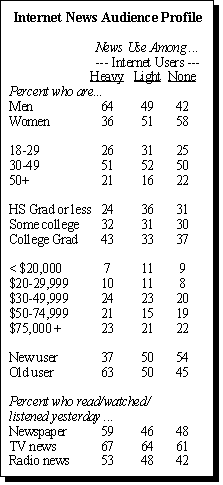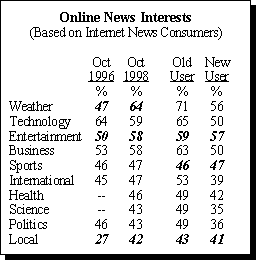
The number of Americans who go online to get news has tripled in the last three years. In 1995, just 4% of Americans went online for news at least once a week. Now, anywhere from 15% to 26% go online for news on a weekly basis, according to recent Pew Research Center surveys. This range reflects some fluctuation in the number of Americans who say they go online for news from one month to the next, as both news events and the way people think about Internet use continue to change.
Among people who use the Internet, a 37% plurality are heavy online news consumers — going online for news at least once a week. Another third only dabble in Internet news, going online specifically for news less than once a week, while 30% of those who use the Internet say they never look for news there.

The population of heavy online news consumers includes substantially more men than women (64% vs. 36%). These users also tend to be better-educated and more experienced in using the Internet. Fully 63% of those who go online for news at least weekly have been using the Internet for more than one year, while just 37% started going online in the past year.
Although older Americans spend more time than younger people reading newspapers and watching television news, there are no real age differences in online news consumption. Reflecting the Internet population in general, Americans between the ages of 30 and 49 comprise at least half of each group — heavy, light and non-news consumers.
Net News Interests
As the sheer number of Americans who go online for news and information continues to grow, online information remains a supplement to — not a replacement for — traditional print and television news. Stark differences are emerging, however, between newcomers to the Internet and longtime users. Americans who first started going online within the last year differ from more experienced Internet users in both the amount of news they consume online and the kind of news that holds their interest.
The broadening of the online population is bolstering interest in feature and local news. More Internet users now seek out news about the weather, local issues and entertainment than in 1996. Today, news about the weather draws the largest audience (64%), followed closely by news about technology (59%), entertainment (58%) and business (58%). Internet users are much more likely to seek out news about the weather and entertainment than they were in 1996; business and technology news are about as popular now as they were two years ago.
The number of online news consumers who turn to the Internet for news about the weather has jumped 17 percentage points since 1996, when 47% sought out this information. Use of the Internet for local news made similar gains (rising to 42% now from 27% two years ago), as did interest in entertainment (rising 8 percentage points).

In general, more experienced Internet users are more news hungry than are relative newcomers. They also express more interest in nearly all types of news than do new users. Among the 70% of online users who get news from the Internet, however, newcomers are just as likely as old hands to seek out softer news topics such as entertainment (57% new vs. 59% old), sports (47% new vs. 46% old) or local news (41% new vs. 43% old).
Why the Net, Not the Networks?
Americans turn to the Internet for news because of the accessibility, convenience and breadth of online searches. Almost half (46%) of Internet users say access to information that is not available elsewhere is a very important reason for using the Web to get news and information. Almost as many cite the advantage of being able to search many different news sources for a particular topic (44%) and the convenience of getting information online (43%) as very important reasons to go online for news. But the most steadfast online news consumers rate convenience as most important: 72% of those who go online for news everyday say using the Internet is more convenient for them.
Similarly, heavy online news users are more likely than light users to rank availability (54% vs. 44%) and convenience (51% vs. 39%) as very important reasons to search for news on the Internet. Fewer Internet users (23%) rank the Web’s audio and visual components as very important reasons for getting news and information online, but half (54%) rank it as at least fairly important.
Only 17% of online users say that the opportunity to give their opinion about what they are reading is a very important reason to search for news or information on the Internet.
Internet Users & Traditional News Media

Internet users read newspapers and listen to radio news at higher rates than do non-users. This is not surprising, given that users say they are more interested in news — especially political news — than are non-users. What is noteworthy is the way in which Internet users have approached news on the Web — as a mechanism for supplementing, not replacing, their traditional media sources.
Almost two-thirds of Internet users (64%) watched television news the day before the interview, over half (51%) read a newspaper and almost as many (48%) listened to news on the radio. Those who go online were more likely than non-users to both read a paper and listen to the radio (51% vs. 45% and 48% vs. 37%, respectively). This appetite for news — from all sources — is not simply a reflection of the better-than-average education and income levels of the online population. The news attentiveness of the online public remains as strong (or stronger) than that of non-users even when these factors are taken into account.
This heavy use of traditional news outlets by Internet users is accompanied by few indications that access to the Internet is crowding out news from other sources. Indeed, most of the data suggest otherwise. Three-quarters of heavy online news consumers still get most of their news from traditional print and broadcast news outlets. Almost as many (63%) say they use other sources just as much now as they did before getting news online. And for a small number of users, getting news online actually leads to more traditional news consumption: 16% of heavy online news users use other sources more now than they did before they started getting news online, a four-fold increase since 1995.

Moreover, when Internet users go to the Web for news, they most often frequent the websites of traditional news outlets. Over one-third of all users have bookmarked the website of a newspaper or network televison news show. Among those who have bookmarks, 61% have used this technique for the websites of traditional news outlets.
Among those who go online for news about current events, public policy or politics, traditional news outlets win out over online-only news sources by margins as great as seven-to-one. For example, 22% go to broadcast news websites, 18% go to MSNBC and 16% go to websites of national newspapers most often, compared to only 3% who log on to online-only magazines this often.
Declines at the Margins
For a small group of users, there are indications that the Internet is beginning to erode their traditional news consumption. One-fifth of Internet users (21%) regularly read news stories online instead of reading them in a newspaper or watching them on television. Almost as many (16%) get more news from online sources than from broadcast and print outlets. And one-in-ten users (11%) say that they are using other sources less now, compared to before they started going online.
For those who have replaced other sources with the Internet, convenience is a driving factor. Two-thirds of those who now favor online news sources over traditional media rank the convenience of online news as a very important reason for getting news this way, compared to 49% of those who have remained loyal to the broadcast and print media.
Finally, there is some evidence that Americans are spending time on the Internet instead of watching television news. When the differences in the demographic characteristics and political attentiveness of online users and non-users are taken into account, heavy Internet news consumers spend slightly less time watching TV news than those who rarely get news online.1
The use of the Internet to supplement news occurs both deliberately and accidentally. Fully 41% of Internet users have logged on to follow-up on a news story that they first saw or heard about somewhere else. Almost half (48%) have bumped into news when they went online for other purposes.
Customized news
Substantial numbers of online users turn to the Internet in search of specific information, not just general news. Electronic news organizations have responded to the public’s desire for specialized and personalized news by developing mechanisms that allow a small but significant minority to develop their own customized news reports.
Fully 39% of online users go online to check the weather, movie times or other local information and almost as many (38%) log on to check stock quotes or sports scores. Just under one-third (29%) regularly go to the Web to check headlines or see what’s in the news.
Receiving tailor-made news online is less popular, but nonetheless significant. Almost one-in-five Internet users (18%) have news stories emailed to them and an equal number (17%) have a customized page that gives them updates on specific news topics.

More experienced Internet users are much more likely than relative newcomers to seek out specialized news online. For example, fully 43% of those who have been online for more than a year use the Internet to check for information about the weather, movies or local issues and 44% turn to the Web for stock quotes or sports scores; compared to 34% and 31%, respectively, of new users. And, while one-third of those who have been surfing the Internet for at least a year regularly go online to check out news headlines, only 24% of those with less experience do so.
The Information Superhighway: “More Accurate”
Americans who visit the World Wide Web put more value on the accuracy of information on the Internet than do Americans who don’t go online. Almost half (49%) of Web users say that Internet news is more accurate than news found in traditional print and broadcast outlets; only 28% of non-online users agree.
The public makes few distinctions between the information that traditional news outlets provide on- and offline. Most Americans (55%) do not think that news organizations’ websites are any more or less accurate than the information available from their traditional outlets. This is even more true of Internet users, 69% of whom see no difference between the accuracy of information that a news organization makes available in different formats.
Not surprisingly, people who believe that information on the Internet is more accurate than traditional outlets are heavy consumers of online news. Almost half of these believers (47%) get news online at least once a week; less than one-third of the skeptics are weekly Internet news consumers.




